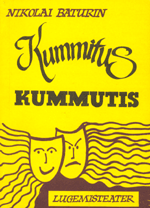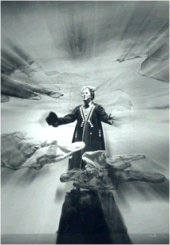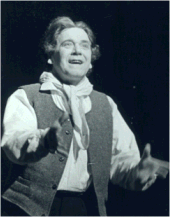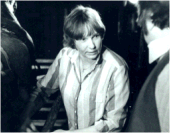




A GHOST IN THE CUPBOARD. ILISSA. AN ENCHANTED VILLAGE.
(A brief synopsis)
I. “A GHOST IN THE CUPBOARD”
A small quiet seaside resort. Amidst a green and lush garden there is a small cozy house owned by a lovely elderly lady named IRMA. She has a tenant, a pantomine star EGLE, who looks after her, and who has a lover called EGERT, the jeweller.
The silence of the night is interrupted by terrible cries from inside the house. The junior investigator UUVE is going to find out what the reason for this terrible noise is. He is supervised by a senior investigator. In the course of the investigation it becomes clear that the reason for the cries is the “ghost in the cupboard”. In one of its drawers IRMA keeps the relics of her late sister, the letters that have been sent by a man whom both sisters loved. The drawer opens precisely at midnight and IRMA feels pangs of conscience as she is to blame for the death of her sister.
The junior investigator UUVE (who has fallen in love with the attractive pantomine actress) finds out that the drawer is opened and closed by iron levers moved by EGERT in EGLE's room. EGERT and his lover, who takes care of the elderly lady, conspire with the aim of sending the nervous old lady to the mental hospital. However, IRMA has understood what the game is all about, she just pretends that she is frail and about to lose her mind. Suddenly, comedy turns into tragedy as this lovely old lady commits another murder, a clever trick that she enjoys.
II. “ILISSA” (The Ugala Theatre produced it under the title The Golden Coast )
This is the story of a vagrant bard interspersed with songs. A grotesque and absurd tale. Leaving his fields fallow and his cattle unfed, Ado Reinvald, an uneducated peasant and a God-gifted poet, aspires to become a politician. He writes high-flown poems that later become folk songs, fights with other village lads, woos and abandons villages lassies, and being in love with the MUSE is keen on fathering her children. But the MUSE only laughs and says: “The bard's children are his songs!”, and then vanishes into the air from between the bard's arms.
III. “AN ENCHANTED VILLAGE.”
A musical.
The scenery is a naivist painting which comes alive on the stage…
All the villagers, including the vagrant bard and the priest, have gathered on a hill in the middle of the village. Among the villagers is a mortal man called MAARIUS and a spirit woman JUUTJA. And a mortal woman, the ugly but warm-hearted TUUNI, who is in love with MAARIUS…
… TUUNI is loved by POSTBOX BOY, who was drowned a couple of years before. And then, a bolt from the blue: a HERO arrives at the dreamy village. This is ERIK, a one-handed sailor, who seduces the lovesick TUUNI. The old priest prays: “Oh Lord God, why did you send us this stranger? Even a flood would have been better.” The Priest's foreboding is fulfilled: when ERIK and TUUNI are standing in the church to be wed…
some SOLDIERS in monk's clothes charge through the crowd and arrest ERIK. The hero turns out to be a notorious PIRATE and is hanged. TUUNI, who is heartbroken, agrees to marry the POSTBOX BOY…
The bells chime, the band strikes up and the BRIDE and the GROOM sink together into the depths of the sea.
“'Hope is the favourite toy that the human being never abandons!' Baturin wrote in his first play. Indeed, the motif of hope pervades all these plays until it reaches a crescendo. The dramatic potential of Baturin's texts is especially strong in the visual environment that he creates around his characters with generous imagination. The preference of the unusual, a play of contrasts which blends tragedy and hilarious comedy, and the visually enchanting space lend a romantic quality to Baturin's texts.”
/Luule Epner, theatre critic/
“A human soul aspires toward a romantic ideal, when this ideal withers, the soul will be callous.” (BATURIN)